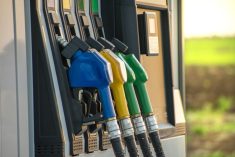Reuters — Imperial Oil, one of Canada’s biggest oil producers and refiners, on Wednesday outlined a plan to process vegetable oil into renewable diesel at its 191,000-barrel-per-day Edmonton-area refinery.
The project, which still requires final approval, is part of majority-owner Exxon Mobil’s goal of producing more than 40,000 barrels per day of low-emissions fuels by 2025.
Calgary-based Imperial aims by 2024 to construct a hydrotreater and use fossil-fuel derived blue hydrogen to process “locally sourced and grown” feedstocks such as canola and soybean oils into 20,000 barrels per day (bpd) of renewable diesel at its Strathcona refinery, it said.
Read Also

India slaps 30 per cent import duty on yellow peas
India has imposed a 30 per cent duty on yellow pea imports with a bill of lading date on or after Nov. 1, 2025.
A decision to proceed will require government support and approvals, favourable market conditions and a determination of the project’s economic competitiveness, an official said. Imperial’s potential investment in the project was not disclosed.
Canada’s Clean Fuel Standard, which takes effect next year, is intended to spur investment in clean-energy technology and create a trading scheme that enables fuel suppliers that do not meet emissions reduction targets to buy credits generated from cleaner fuel producers.
“It enables faster and deeper decarbonization with a market driver so technologies can be developed more effectively,” said Andy Madden, vice president of strategy and planning for Exxon.
Imperial’s production process would capture and store underground about 500,000 tonnes of carbon dioxide each year, Exxon said in a statement.
Canada’s Clean Fuel Standard aims to cut greenhouse gas emissions by 30 per cent below 2005 levels by 2030.
Imperial, which also owns stakes in three Alberta oil sands operations, two fuel refineries in southern Ontario and the Esso and Mobil fuel station chains, said the British Columbia government has already agreed to support the Alberta project through an agreement under its own low-carbon fuel legislation.
The company didn’t specify where it would source plant-based feedstocks, but Alberta is already home to canola crushing plants including those of Cargill at Camrose, Richardson International at Lethbridge and ADM at Lloydminster.
Crush capacity is expected to increase also in neighbouring Saskatchewan, where Richardson recently announced plans to double its handle at Yorkton, while Cargill and Viterra each plan to build facilities in the Regina area.
Refiners in the U.S., including Valero Energy and Marathon Petroleum, are using federal and state incentives in that country to produce renewable diesel.
If all renewable fuel projects were complete, U.S. renewable diesel production would total 330,000 bpd by the end of 2024, according to the U.S. Energy Information Administration, equal to about seven per cent of 2020 diesel output according to Reuters calculations.
— Laura Sanicola reports on the U.S. energy sector for Reuters from New York. Includes files from Glacier FarmMedia Network staff.












